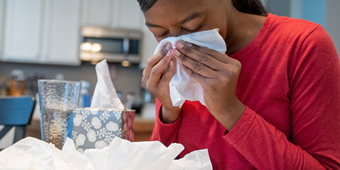Why is My Asthma Getting Worse?
.jpg?sfvrsn=1f33b9c5_2)
Answer a few questions and we'll provide you with a list of primary care providers that best fit your needs.
You may not be able to see them, but if you have asthma, your body will know they’re there. Allergens and irritants lurk in lots of everyday places. If you breathe them in, they can bother your lungs and lead to asthma symptoms.
When you have asthma, your symptoms can be triggered by a number of common irritants. Your triggers can be very different from those of someone else with asthma. To prevent the discomfort of asthma symptoms or even an asthma attack, learn your triggers and how to avoid them..jpg?sfvrsn=ee1987d0_2&Status=Master)
Common Asthma Triggers
Watch out for these triggers:
- Tobacco smoke: Smoking cigarettes, or just being near someone who is smoking, is especially unhealthy if you have asthma.
- Dust mites: Just about every home has dust mites — tiny bugs that hide in your mattress and bedding, as well as in upholstered furniture, carpets and drapes.
- Air pollution: Outdoor air can be filled with high levels of pollution from factories, cars and other sources.
- Cockroaches: They’re attracted to any spot where you eat food and drop crumbs.
- Pets: Animal dander and fur are another source of irritation. Even if animals are no longer in the room, their dander remains.
- Mold: Mold can grow just about anywhere it’s humid, especially bathrooms and kitchens.
- Wood smoke: Smoke generated from burning wood or other plants, like grass, is made up of harmful gases and tiny particles that can cause an attack if you breathe in too much.
- Infections (flu, colds, sinus, RSV): Respiratory illnesses or the flu can make you more susceptible.
- Stress: Anne Reitz, MD, Samaritan North Family Physicians, says that a stressful situation or strong emotional response – like shouting, crying or laughing — can lead to rapid breathing, which may provoke or worsen an asthma attack.
Click play to watch the video or read video transcript.
- Weather: Be wary in weather conditions like extreme cold, high humidity or thunderstorms.
- Physical activity: Exercise and breathing hard can bring on an attack.
- Smells: Even something as pleasing as perfume or a scented home spray can trigger asthma.
- Others: Allergies, pollen (from trees, grasses and flower), certain foods and food additives, and even some medicines can cause symptoms.
Your triggers can be very different from those of someone else with asthma.
If you have breathing difficulties that interfere with your daily activities, take steps to avoid or control your triggers, and see a doctor or allergist for diagnosis and treatment.
Answer a few questions and we'll provide you with a list of primary care providers that best fit your needs.
Source: Premier Health Prevention and Wellness: Asthma and Allergies content; American College of Allergy, Asthma and Immunology; Centers for Disease Control; Anne Reitz, MD, Samaritan North Family Practice






